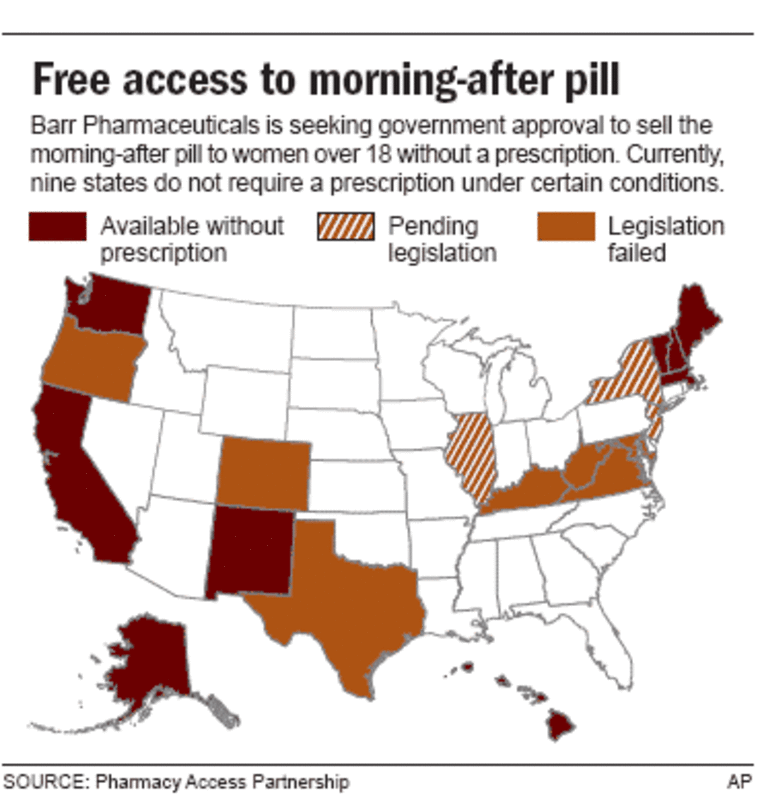Women over 18 may soon be able to get the morning-after pill without a prescription. In a surprise decision Monday, health officials revived a long-stalled application to allow over-the-counter sales of the emergency contraceptive.
The Food and Drug Administration told Barr Pharmaceuticals Inc. that it wanted to meet within a week to discuss how to allow adults to freely buy the contraceptive — known as Plan B — while keeping it prescription-only for people under 18.
The contraceptive still would be available only from behind pharmacy counters.
The announcement came just 24 hours before President Bush’s nominee to lead the regulatory agency, Dr. Andrew von Eschenbach, was to appear before a Senate committee.
Accused of 'delay tactics'
Sens. Patty Murray, D-Wash., and Hillary Rodham Clinton, D-N.Y., called the FDA announcement a “delay tactic” and promised to continue blocking von Eschenbach’s nomination pending a final decision on the contraceptive. The morning-after pill was expected to be the focus of Tuesday’s hearing.
The FDA said it hoped to wrap up talks with Barr within weeks.
“We think this is a positive development. We will see how the meeting goes and move forward from there,” company spokeswoman Carol Cox said.
However, the FDA held out the possibility it could keep Plan B prescription-only if Barr’s plan to restrict over-the-counter sales to adult women wasn’t “sufficiently rigorous,” von Eschenbach wrote the company.
“We sincerely hope the FDA is not bending to a political ploy and that they are definitely going to do what they said they would do in the past, and that is make a decision based on science regarding the over-the-counter availability of Plan B,” said Dr. Vanessa Cullins, vice president for medical affairs at Planned Parenthood Federation of America.
The morning-after pill is a high dose of the most common ingredient in regular birth control pills. When taken within 72 hours of unprotected sex, the two-pill series can lower the risk of pregnancy by up to 89 percent.
The pills, which do not work if a woman is already pregnant, prevent ovulation or fertilization of an egg. They also may prevent the egg from implanting into the uterus, considered the medical definition of pregnancy, although recent research suggests that’s not likely.
Laws in nine states allow pharmacists to dispense Plan B without a doctor’s prescription under certain conditions.
Contraceptive advocates and doctors groups say easier access to Plan B could halve the nation’s 3 million annual unintended pregnancies. Opponents say wider access to the pill could promote promiscuity.
The FDA’s own scientists say the pills are safe, and in December 2003 a panel of independent advisers overwhelmingly backed nonprescription sales for all ages.
The FDA rejected that recommendation, citing concern that young teens could use the pills without a doctor’s supervision. Barr reapplied, asking that women 16 and older be allowed to buy Plan B without a prescription and setting up a program for pharmacists to enforce the age rule — just as stores now bar cigarette sales to minors.
Decision postponed last year
Last August, FDA’s then-chief, Lester Crawford, postponed a decision indefinitely. Crawford said the agency needed to determine how to enforce those age restrictions — a process that required writing new regulations.
Monday, the FDA reversed itself and said that a review of about 47,000 comments from the public convinced it that new rules weren’t needed after all.
Before the FDA can reconsider Barr’s application, the company must make the following changes:
- Restrict sales of the medication to women 18 and older, not 16 as it had sought.
- Package the nonprescription and prescription versions of the pill differently, though both would be kept behind the pharmacy counter.
- Provide details on how the age restriction would be enforced and on its plan to restrict sales to certain pharmacies.
“We already said that we would only sell to pharmacies — to places where there was a pharmacist, not to convenience stores,” Cox said.

Asked why the FDA was moving forward now, 11 months after delaying a decision, FDA spokeswoman Susan Bro said von Eschenbach wanted to spend less of Tuesday’s hearing on this contentious issue and more on his own plans for the agency, if confirmed as its chief.
“He knew it was critical that he be able to provide tomorrow a thoughtful approach to resolving what has been one of the most divisive issues the agency has faced in order for him to present his broad and ambitious vision for the FDA,” Bro said.
Clinton and Murray had allowed Crawford to be confirmed after receiving a pledge from Mike Leavitt, the secretary of health and human services, that the FDA would decide on Barr’s Plan B application. Crawford resigned in September, a month after he put the application on hold.
On Monday, Leavitt said the FDA announcement “demonstrates a good faith effort on the part of Dr. von Eschenbach to help resolve the issues surrounding Plan B.”
Clinton and Murray disagreed, saying in a joint statement, “Rather than moving this process forward and doing right by the American people, the administration is continuing to play a game of smoke and mirrors.”
Barr shares rose 93 cents, or 1.9 percent, to close at $49.76 Monday on the New York Stock Exchange.